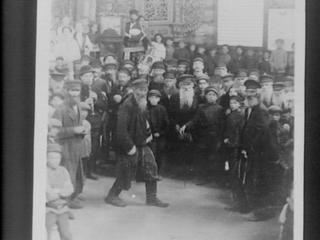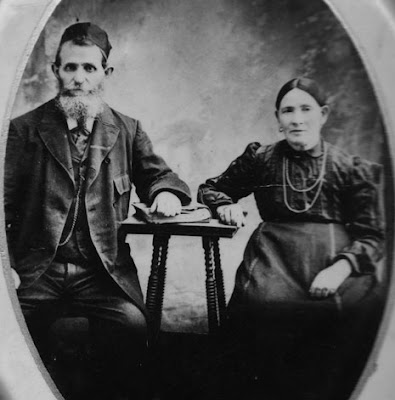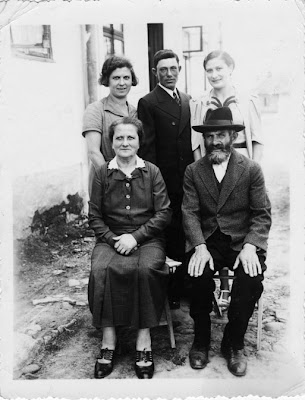
[Note: This is the sixth letter Papa wrote to my grandmother while she was vacationing at her cousin’s farm in Connecticut. To see full-sized scans of the letter, click the thumbnail images on the right of this page.]
——–
 May 4th 1925
May 4th 1925
My dear Jeanie:
Back in the old town writing to my
soul friend.1
It certainly was a dream in reality
the country, the beautiful natural
surroundings which I love so much
and with you there it was a pleasure
and inspiration, such as only the pen
of an artist can describe.2
My heart was filled with longing as
the train pulled out of the Willimantic
station3, knowing that every second the
train carried me further and further away
from you.
The trip presented an opportunity
to view a fine scenery of towns, villages
and beautiful landscapes, as the train
rushed through the wide open spaces.3A
I arrived at 10:30 daylight saving
time and immediately at the station
called up your folks, I spoke to Sally
and after I mail this letter I will go
there and tell your folks of what I’ve seen
 (over)
(over)
I’ve put through today an honest day’s
work, but all day I’ve been thinking how
different it was yesterday at this time.
At the noon hour during the great rush
at the restaurant I thought of this very
moment a day before when I sat near you
when you were in the hammock, I sang
for you trying to put you to sleep.
Do you remember? It was so quiet around
that you could hear the telephone wires
humming, and here I am again between
the tall structures and the mass of
humanity.4
I guess it will be enough of sentimentality.
Again I wish to thank the Kresewitzes
for the fine treatment, that bargain you
know was a surprise.
In closing I wish to extend my
kindest regards to the Kresewitz family
to Oscar & Barney the Steins and all
all others that are kind to you.
I am as ever
Your devoted
Harry
P.S.
Will write another one tonight.
———
Matt’s Notes
1 – In his previous letter, Papa mentioned his plan to get on an “Express-train” and visit my grandmother at her cousin’s farm in Connecticut, and he’s obviously just returned from the trip.
I find Papa’s use of the expression “back in the old town” sort of charming, but when I looked around to see if it was prohibition-era vernacular I learned it was actually old-fashioned at the time Papa wrote this letter. (To wit, the World War I song “Back in the Old Town Tonight” was around in 1916, and “A Hot Time in the Old Town Tonight” had been a standard since the 1880’s.) Did Papa write “back in the old town” in a jokey, retro sort of way? Would my grandmother, at nineteen, have understood the irony?
For our own reference, here’s Bessie Smith’s 1927 recording of “A Hot Time in the Old Town Tonight”:
2 – Despite the wall-to-wall urban trappings of Papa’s life as depicted in his diary and letters (he writes about subways, operas, baseball games, “auto” trips to Coney Island, walks on the Brooklyn Bridge, romantic encounters on trolleys, and on and on) this passage reminds us that, as of the mid- 1920’s, he’d still spent the better part of his life in Sniatyn, an Austro-Hungarian hamlet surrounded bordered by the river Prut and surrounded by woodlands. A modern-day satellite view of Sniatyn shows it to be relatively rural still:
View Larger Map
Papa no doubt spent endless boyhood hours in the woods or by the river, lost among the leaves and lichens and frogs and birdsong, feeling comfortable and safe. It could have been among those trees that he played with his friends, had his first kiss, savored the rare chance to walk alone with his father. When he longed for home and family, as he had done for so many years, part of what he missed was the forest and its surrounding hills. (I’ve often read and heard that Eastern European Jews started vacationing in the Catskill Mountains in part because the terrain is not unlike Eastern Europe’s. A Ukrainian friend recently told me, after he hiked in the Catskill region, that the area reminded him of the Carpathian Mountains. I suppose I’ll have to go and find out for myself.)
When Papa finally built a family of his own, he did his best to find “beautiful natural surroundings” in the parks and plant beds of Brooklyn. My mother particularly remembers how he would take her out each spring to hunt for nascent plants and flowers and teach her their names.
3 – The Willimantic Train Station:
View Larger Map
3A – Updated 2/12/07 – Papa’s Diary Project’s Executive Director of Transportation History, a mysterious figure who goes only by the name “Fred,” has this to say about Papa’s train trip from Willimantic: “Papa probably traveled on the New York, New Haven and Hartford Railroad from Willimantic to New Haven, and thence to New York. I believe you’d have to take a bus from Willimantic these days to connect with Amtrak at New London.” There’s more on this page at Willimantic’s Connecticut Eastern Railroad Museum site (scroll down to the middle right of the page).
4 – When Papa wrote this, he must have still been intoxicated with the memory of singing my grandmother to sleep in the noonday quiet of the country. Did this memory, and the feeling of perfect simplicity it evoked, stay with him throughout his life? Did he drift into a reverie when he thought about it in later years? I also wonder if, when he wrote “do you remember?” to my grandmother, he was referring to a more intimate detail of their time in the hammock (a memorable kiss, perhaps) that he found unnecessary (or maybe improper) to write down.
I’d also like to know what song he chose to put her to sleep. If the setting reminded him of his boyhood home he may have chosen something from his youth, or maybe he selected something more modern with a touch of old-country flavor. My best guess is “The Gypsy Love Song,” a.k.a. “Gypsy Serenade (Slumber on My Little Gypsy Sweetheart)”, which Papa had heard on the radio a year before and used to sing to my mother in later years. Here it is again, from archive.org:
The Internets have informed me that this song was written by Victor Herbert and Harry B. Smith for the 1898 musical “The Fortune Teller” and became relatively famous thereafter. A number of artists covered it, including Chico Marx (in 1929’s The Cocoanuts) and the Isley Brothers. A look at the lyrics shows it to be a good candidate for Papa’s serenade to my grandmother on a warm spring Sunday:
The birds of the forest are calling for thee
And the shades and the glades are lonely
Summer is there with her blossoms fair
And you are absent only
No bird that nests in the greenwood tree
But sighs to greet you and kiss you
All the violets yearn, yearn for your safe return
But most of all I miss you
Slumber on, my little gypsy sweetheart
Dream of the field and the grove
Can you hear me, hear me in that dreamland
Where your fancies rove
Slumber on, my little gypsy sweetheart
Wild little woodland dove
Can you hear the love song that tells you
All my heart’s true love
The fawn that you tamed has a look in its eyes
That doth say, “We are too long parted”
Songs that are trolled by our comrades old
Are not now as they were light hearted
The wild rose fades in the leafy shades
Its ghost will find you and haunt
All the friends say come, come to your woodland home
And most of all I want you
————-
References:
- “Back in the Old Town Tonight” sheet music is available at the University of Indiana Web site.
- Information on “Hot Time In the Old Town“, including a scan of the sheet music cover, is available at the University of San Diego Web site.
- A New York Times article from 1898, the year “Hot Time in the Old Town” became the theme song of American soldiers in the Spanish-American war (Theodore Roosevelt’s Rough Riders) says it was written by a “Denver negress” named Amanda Green. Most other sources, like this 1935 Time Magazine article, credit Theodore Metz and Joe Hayden with its composition.
- “Gypsy Love Song” lyrics are available at lyricsplayground.com, and the Duke University Library site has scans of the original sheet music’s cover page, lyrics, and music.









 His fellow congregants probably danced in the halls of the schul and poured out onto East Broadway, singing Hebrew songs and crowding together as they did on
His fellow congregants probably danced in the halls of the schul and poured out onto East Broadway, singing Hebrew songs and crowding together as they did on 






